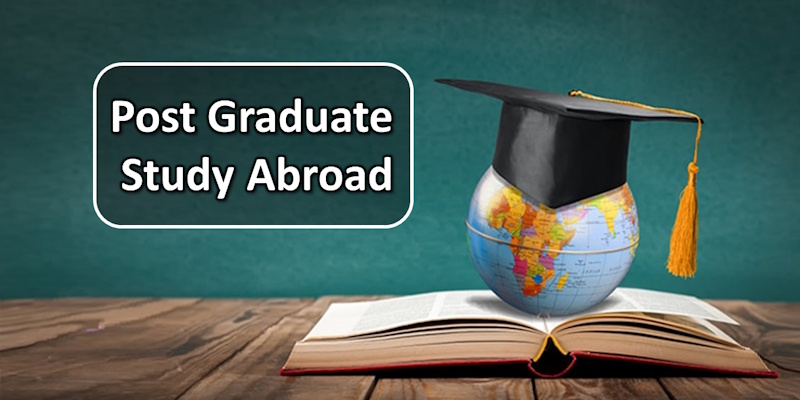Studying abroad is a dream for many students, and pursuing a postgraduate degree (master’s level) in a foreign country can transform your career. Postgraduate programs not only provide advanced academic knowledge but also enhance professional skills, global exposure, and research opportunities.
If you’re considering higher studies abroad, this guide covers everything you need to know about postgraduate degrees, eligibility, costs, and career prospects.
What is a Postgraduate Degree?
A postgraduate degree (PG degree) is an advanced academic qualification undertaken after completing a bachelor’s degree. It focuses on specialized knowledge, research, and professional expertise in a chosen field.
Common types of postgraduate degrees abroad:
- Master of Arts (MA) – Humanities, Social Sciences, Languages.
- Master of Science (MSc) – Science, Technology, IT, Healthcare.
- Master of Business Administration (MBA) – Business, Finance, Management.
- Master of Engineering (MEng) – Engineering & Technical fields.
- LLM (Master of Law) – Advanced Law studies.
- MD/MS (Postgraduate Medicine) – Medical specialization programs.
Some countries also offer Postgraduate Diplomas (PGD) and Postgraduate Certificates as alternatives to full master’s programs.
Why Study a Postgraduate Degree Abroad?
- High-Quality Education – Learn from world-class universities and global faculty.
- Specialization – Gain expertise in a focused subject or professional area.
- Global Networking – Build connections with international peers and industry experts.
- Research Opportunities – Access advanced labs, resources, and innovation hubs.
- Career Advancement – Boost employability and earning potential.
- Work & Residency Options – Many countries allow post-study work visas and PR pathways.
- Personal Growth – Living abroad builds independence, confidence, and global awareness.
Duration and Cost
- Duration:
- UK & Europe – 1 year
- USA, Canada, Australia – 1.5 to 2 years
- Medicine/Research fields – 2+ years
- Average Tuition Fees:
- USA: USD 20,000 – 60,000 per year
- UK: GBP 12,000 – 30,000 per year
- Canada: CAD 15,000 – 35,000 per year
- Australia: AUD 20,000 – 45,000 per year
- Germany & France: Low-cost or tuition-free (small semester fee)
Top Destinations for Postgraduate Degrees Abroad
- United States (USA): Flexible education system, Ivy League, strong research focus.
- United Kingdom (UK): One-year master’s, globally recognized degrees.
- Canada: Affordable tuition, PR-friendly policies, research-based programs.
- Australia: Industry-linked courses, post-study work visas, quality universities.
- Germany: Tuition-free or low-cost education, top technical universities.
- France: World-class business and fashion schools, affordable education.
- New Zealand: Safe, innovative, and excellent post-study work options.
- Singapore: Globally ranked universities with industry partnerships.
Admission Requirements
Eligibility differs by country and program, but general requirements include:
- Bachelor’s Degree: From a recognized university with minimum 50–65% (higher for top universities).
- English Language Proficiency: IELTS/TOEFL/PTE scores.
- Standardized Tests: GRE, GMAT (for some courses like MBA, STEM).
- Documents Required:
- Academic transcripts & certificates
- Statement of Purpose (SOP)
- Letters of Recommendation (LORs)
- Resume/CV
- Research proposal (for research-based master’s)
- Valid passport
How to Apply for a Postgraduate Degree Abroad?
- Choose Your Course & Country – Match your career goals with the right specialization.
- Research Universities – Look for rankings, faculty, facilities, and placement records.
- Check Admission Requirements – Academic scores, tests, and deadlines.
- Prepare for Exams – IELTS/TOEFL/PTE, GRE/GMAT if required.
- Prepare Documents – SOP, LORs, Resume, Academic transcripts.
- Apply Online – Directly on university websites or centralized portals (UCAS for UK, DAAD for Germany).
- Receive Offer Letter – Accept admission and pay initial tuition fees.
- Apply for Student Visa – Submit visa documents and attend interviews if required.
- Arrange Funding & Accommodation – Plan finances and housing before departure.
Scholarships for Postgraduate Students Abroad
Many scholarships are available to reduce financial burden:
- USA: Fulbright Scholarships, university-specific awards.
- UK: Chevening Scholarships, Commonwealth Scholarships.
- Canada: Vanier Graduate Scholarships, university funding.
- Australia: Australia Awards, Research Training Program (RTP).
- Germany: DAAD Scholarships.
- France: Eiffel Excellence Scholarships.
- New Zealand: New Zealand Excellence Awards.
Career Opportunities After Postgraduate Studies
A postgraduate degree abroad can significantly boost career opportunities:
- Higher employability in global companies.
- Research & academic careers.
- Strong chances of securing post-study work visas.
- Better salaries and leadership roles.
- Opportunities for permanent residency (Canada, Australia, New Zealand).
Frequently Asked Questions (FAQs)
Q1. Is a postgraduate degree abroad worth it?
Yes, it offers advanced knowledge, international exposure, and career growth opportunities.
Q2. Can I work part-time while studying a postgraduate degree abroad?
Yes, most countries allow international students to work 10–20 hours per week.
Q3. Do all PG programs require GRE/GMAT?
No, only some universities (mainly in the USA) require these tests. Many accept applications without them.
Q4. Can I get PR after a postgraduate degree abroad?
Yes, countries like Canada, Australia, and New Zealand offer PR pathways after postgraduate studies.
Q5. Can I do a postgraduate diploma instead of a degree?
Yes, PG diplomas are shorter and career-focused, often leading to jobs and PR pathways.
A postgraduate degree abroad is more than just an advanced qualification—it’s a gateway to global opportunities. With world-class universities, international exposure, and strong career prospects, pursuing a PG degree can help you achieve your academic and professional dreams.
With the right planning, funding, and choice of country, your postgraduate journey abroad can be one of the most rewarding investments in your future.
 Foundation
Foundation Diploma
Diploma Bachelor
Bachelor Postgraduate
Postgraduate Master
Master MBA
MBA DBA
DBA Ph.D
Ph.D